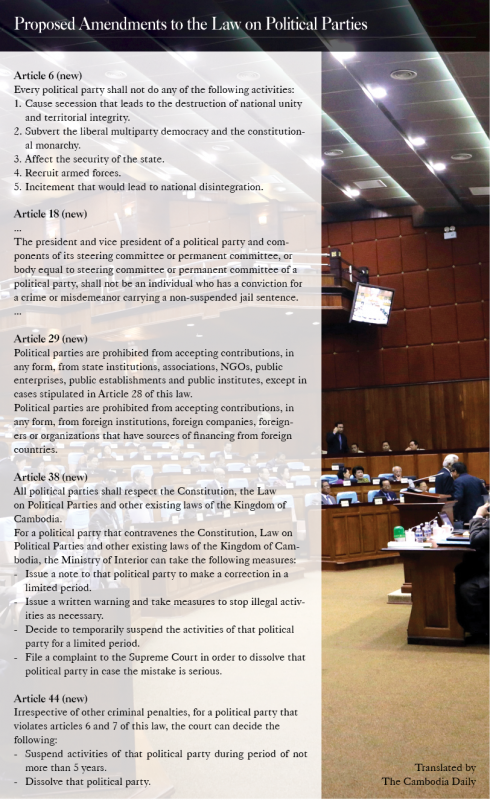Proposed legal amendments that would give the government and courts unprecedented powers to suspend and abolish entire political parties sailed through the National Assembly’s legislative commission on Tuesday, leaving them just one step away from a full parliamentary vote.
The ruling CPP has moved with double time to amend the Law on Political Parties since Prime Minister Hun Sen went public with the proposal earlier this month, including a clause that can have any party dissolved for the “serious mistakes” of the party’s top officials.

National Assembly spokesman Leng Peng Long said on Tuesday the legislative commission “changed nothing” in the draft amendment and that the CPP-controlled permanent committee would set a date for a vote by the National Assembly today.
“The legislative and justice commission finished their review and they have sent a report to the permanent committee to set a date for the plenary session,” he said. “It is now in the hands of the permanent committee and they will hold a meeting tomorrow.”
Critics say the changes are clearly aimed at the CNRP, which nearly defeated the long-ruling CPP in the 2013 national elections and remains its only realistic challenger next year. The threat of the amendments pushed Sam Rainsy, who faces a raft of charges and convictions widely seen as politically motivated, into resigning as president of the opposition over the weekend in hopes of saving the party.
But with plenty more fodder left to use against the CNRP—several other party leaders are still facing their own criminal charges and investigation, including acting President Kem Sokha—the CPP has pressed ahead with the legal changes.
The “serious mistakes” that could get a party dissolved would include any acts that “cause secession,” “lead to destruction of national unity,” “affect the security of the state” or “subvert liberal multi-party democracy.” Once dissolved, the court can then bar its leaders from political activity for up to five years.
Even before reaching the court, the Interior Ministry would be able to “temporarily suspend” any party it deems to have violated the Constitution or any other law for an unspecified “limited period.”
Anyone convicted of a misdemeanor or felony and sentenced to a non-suspended prison term would not be allowed to serve as president or vice president or sit on a steering committee, permanent committee or any other equivalent party body.
Critics say the vague language is rife for abuse by a government free from the checks and balances of a functioning democracy.
Koul Panha, head of the Committee for Free and Fair Elections, a nongovernment election watchdog, agreed with the CNRP that the proposed amendments would violate the Constitution’s guarantee to the freedom of association.
By suspending or abolishing a whole party over one person’s actions, “you abolish the will of the people, who elected the party to represent them,” he said. “I think it is unconstitutional.”
Mr. Panha said it was dangerous in any country to give an executive body so much control over political parties, but especially in a country like Cambodia with a judicial system in thrall to the party in power.
“This is a really politically motivated law to oppress the opposition; it’s really clear,” he said. “The executive is the partisan organization, and [with these amendments] they can control the other party.”
Kem Monovithya, the opposition’s deputy director of public affairs, took to Twitter to say that life under these amendments would be even worse for the party than being dissolved.
“CNRP existence under these restrictions is worse than being abolished, making us a rubber stamp opposition legitimizing authoritarian rule,” she tweeted.
CPP lawmaker and spokesman Chheang Vun defended the draft’s vague language and confirmed that the Interior Ministry would get to decide for itself how long to suspend a party for.
“We can amend it without making any changes” to the draft, he said. “The important thing is we can do it; the CPP has 68 seats in the Assembly.”
CNRP lawmaker and spokesman Yim Sovann declined to comment on the draft and referred questions to fellow party lawmakers Son Chhay and Eng Chhay Eang.
Mr. Chhay could not be reached. Mr. Chhay Eang said he did not know if anyone from the party had attended Tuesday’s commission meeting.
He said he did not know if any of them would attend today’s permanent committee meeting, either, and that the party had yet to decide whether to show up for any full Assembly session where the draft is up for vote.
The CNRP has been boycotting Assembly sessions in protest against controversial legislation on a case-by-case basis. Mr. Hun Sen reacted to their last boycott by announcing that government ministers would no longer appear for questioning before lawmakers, a move that violates the Constitution.
(Additional reporting by Zsombor Peter)